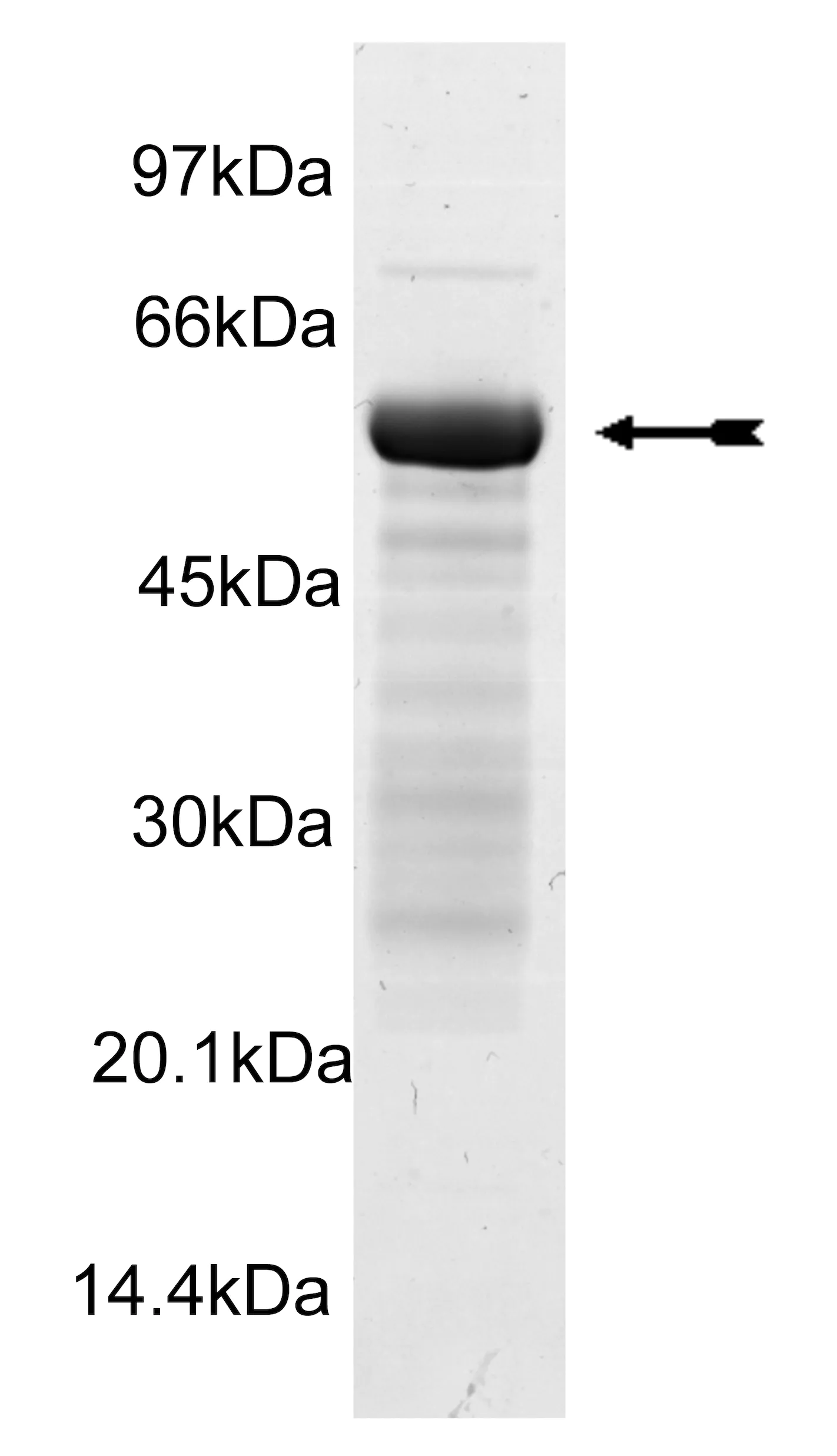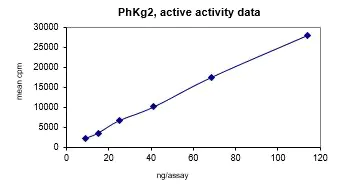PhKg2, active Human Recombinant Kinase Protein
GST-tagged recombinant, PhKγ2 amino acids 1-301 containing the mutation F290L.
Biological information
Background
Phosphorylase kinase (Phk) is a complex enzyme consisting of four different subunits, (abgd)4, and isoforms or splice variants exist for each subunit. A muscle specific form of Phk deficiency is caused by mutations in the gene for the muscle isoform of the a subunit, PHKA1, whereas liver Phk deficiency can be caused by mutations in three genes: PHKA2, PHKB, and PHKG2. PHKB mutations cause autosomal recessive Phk deficiency of both liver and muscle, but liver symptoms predominate and the biochemical muscle involvement is often not clinically apparent. Ten different mutations in the PHKB gene have been identified in seven patients. PHKG2, also autosomal, encodes the testis/liver isoform of the catalytic g subunit. PHKG2 is a serine/threonine kinase that plays an important role in glycogen metabolism. Inhibition of PHKG2 may result in recurrent hypoglycemia, liver fibrosis and increased risk of cirrhosis.
Target class
Kinase
Family
CAMK
Accession number
NM_000294.1
Target Name
PhKg2, active Human Recombinant Kinase Protein
Target Alias
PHKG2, PSK-C3, PHK-gamma-T
Origin
Human
Theori. MW
61.37 kDa
Affinity tag
GST
Product specifications
Expression system
Expressed in E. coli
Purity
Refer to CoA for Purity
Purification method
Glutathione agarose affinity chromatography
Sample Buffer
Specified activity
Refer to CoA
Application
For Research Only
Storage conditions
6 months at -70°C
Usage disclaimer
For Research Only
Chemical data
Background
Phosphorylase kinase (Phk) is a complex enzyme consisting of four different subunits, (abgd)4, and isoforms or splice variants exist for each subunit. A muscle specific form of Phk deficiency is caused by mutations in the gene for the muscle isoform of the a subunit, PHKA1, whereas liver Phk deficiency can be caused by mutations in three genes: PHKA2, PHKB, and PHKG2. PHKB mutations cause autosomal recessive Phk deficiency of both liver and muscle, but liver symptoms predominate and the biochemical muscle involvement is often not clinically apparent. Ten different mutations in the PHKB gene have been identified in seven patients. PHKG2, also autosomal, encodes the testis/liver isoform of the catalytic g subunit. PHKG2 is a serine/threonine kinase that plays an important role in glycogen metabolism. Inhibition of PHKG2 may result in recurrent hypoglycemia, liver fibrosis and increased risk of cirrhosis.
Compound name
Kinase
Catalog number
14-698
Molecular formula
CAS
MW
Ka
Percent composition
Product specifications
Physical state
Purity (HPLC 214nm)
Retention time (RP18 HPLC)
CMC
Exact mass
Stability
For Research Only
Solubility structure
Kinase Activity Assay Biological information
Background
Phosphorylase kinase (Phk) is a complex enzyme consisting of four different subunits, (abgd)4, and isoforms or splice variants exist for each subunit. A muscle specific form of Phk deficiency is caused by mutations in the gene for the muscle isoform of the a subunit, PHKA1, whereas liver Phk deficiency can be caused by mutations in three genes: PHKA2, PHKB, and PHKG2. PHKB mutations cause autosomal recessive Phk deficiency of both liver and muscle, but liver symptoms predominate and the biochemical muscle involvement is often not clinically apparent. Ten different mutations in the PHKB gene have been identified in seven patients. PHKG2, also autosomal, encodes the testis/liver isoform of the catalytic g subunit. PHKG2 is a serine/threonine kinase that plays an important role in glycogen metabolism. Inhibition of PHKG2 may result in recurrent hypoglycemia, liver fibrosis and increased risk of cirrhosis.
Target class
Kinase
Family
CAMK
Subfamily
Protein Name
PhKg2
Protein Alias
PHKG2, PSK-C3, PHK-gamma-T
Accession Number
NM_000294.1
UniProt Number
Gene Name
Gene ID
Gene Aliases
Target Species
Human
Kinase Activity Assay Usage
Product Type
Application
Storage Conditions
6 months at -70°C
Usage disclaimer
Kinase Activity Assay Information
Assay Type
Assay Measures
Biological Information
Background
Phosphorylase kinase (Phk) is a complex enzyme consisting of four different subunits, (abgd)4, and isoforms or splice variants exist for each subunit. A muscle specific form of Phk deficiency is caused by mutations in the gene for the muscle isoform of the a subunit, PHKA1, whereas liver Phk deficiency can be caused by mutations in three genes: PHKA2, PHKB, and PHKG2. PHKB mutations cause autosomal recessive Phk deficiency of both liver and muscle, but liver symptoms predominate and the biochemical muscle involvement is often not clinically apparent. Ten different mutations in the PHKB gene have been identified in seven patients. PHKG2, also autosomal, encodes the testis/liver isoform of the catalytic g subunit. PHKG2 is a serine/threonine kinase that plays an important role in glycogen metabolism. Inhibition of PHKG2 may result in recurrent hypoglycemia, liver fibrosis and increased risk of cirrhosis.
Target class
Kinase
Family
CAMK
Accession Number
NM_000294.1
Target Name
PhKg2
Target Alias
PHKG2, PSK-C3, PHK-gamma-T
Origin
Human
Theoretical MW
Affinity Tag
GST
Product Specifications
Expression system
Expressed in E. coli
Purity
Refer to CoA for Purity
Purification method
Glutathione agarose affinity chromatography
Sample Buffer
Specified activity
Refer to CoA
Application
Storage conditions
6 months at -70°C
Usage disclaimer
For Research Only
Biological Information
Background
Phosphorylase kinase (Phk) is a complex enzyme consisting of four different subunits, (abgd)4, and isoforms or splice variants exist for each subunit. A muscle specific form of Phk deficiency is caused by mutations in the gene for the muscle isoform of the a subunit, PHKA1, whereas liver Phk deficiency can be caused by mutations in three genes: PHKA2, PHKB, and PHKG2. PHKB mutations cause autosomal recessive Phk deficiency of both liver and muscle, but liver symptoms predominate and the biochemical muscle involvement is often not clinically apparent. Ten different mutations in the PHKB gene have been identified in seven patients. PHKG2, also autosomal, encodes the testis/liver isoform of the catalytic g subunit. PHKG2 is a serine/threonine kinase that plays an important role in glycogen metabolism. Inhibition of PHKG2 may result in recurrent hypoglycemia, liver fibrosis and increased risk of cirrhosis.
Target class
Kinase
Family
CAMK
Accession Number
NM_000294.1
Target Name
PhKg2
Target Alias
PHKG2, PSK-C3, PHK-gamma-T
Origin
Human
Theoretical MW
Affinity Tag
GST
Product Specifications
Expression system
Expressed in E. coli
Purity
Refer to CoA for Purity
Purification method
Glutathione agarose affinity chromatography
Sample Buffer
Specified activity
Refer to CoA
Application
Storage conditions
6 months at -70°C
Usage disclaimer
For Research Only





